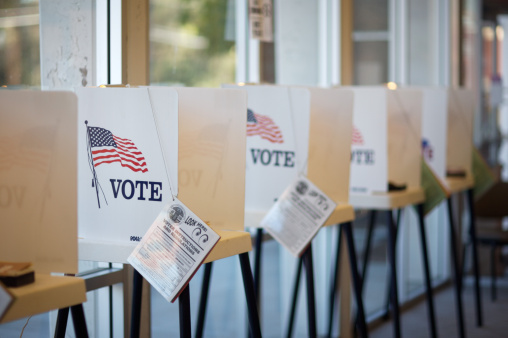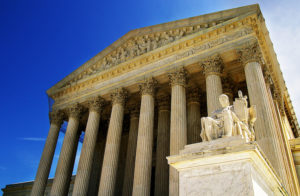
Voter ignorance bolsters arguments for judicial review and limited government.
Democracy is intended to be rule by the people. But all too often, the people have all too little understanding of what they rule over. Political ignorance is a ubiquitous and persistent problem in modern democracy. It strengthens the case for limiting and decentralizing political power, and for judicial review.
Much evidence shows that the public is ignorant about many aspects of government and public policy. Despite years of debate over the federal government’s fiscal problems, polls show that voters grossly underestimate the percentage of federal spending that goes to entitlements such as Social Security and Medicare, while massively overestimating the amount spent on foreign aid. Although the latter accounts for about 1 percent of the federal budget, surveys show that most Americans believe that it is five to ten times more than that. The Affordable Care Act of 2010 is another major current political issue. Yet an August 2013 Kaiser Family Foundation survey showed that 44% did not even realize that Obamacare is still the law.
The public is also often ignorant about the basic structure of government. A 2006 Zogby poll found that only 42 percent of Americans can even name the three branches of the federal government: executive, legislative, and judicial. Political ignorance has remained at roughly the same level for decades, despite rising educational attainment.
Public ignorance is not the result of stupidity or lack of available information. The internet and other modern technology has made political information more widely available than ever before in human history. Average IQ scores have risen substantially over the last several decades. The problem is not lack of information or intelligence. It is that most of us are not using our intelligence to learn and process the political information that is readily available.
Such behavior is actually rational. If your only incentive to follow politics is to be a better voter, that isn’t much of an incentive at all. There is very little chance that your vote will actually make a difference to the outcome of an election (about 1 in 60 million in a presidential race, for example). There is little point in spending more than a minimal amount of time acquiring the knowledge you need to make a well-informed choice if that choice is so unlikely to make any difference.
Some people, of course, follow politics for reasons other than becoming better voters. Just as sports fans love to follow their favorite teams, so “political fans” love to cheer on their favorite candidates, parties, or ideologies. Unfortunately,political fans tend to evaluate new information in a highly biased way. They overvalue anything that supports their preexisting views, and undervalue or ignore new data that cuts against them. Such bias is actually rational if the goal of gathering information is not seeking truth, but enhancing the fan experience.
Perhaps the most obvious solution for political ignorance is to increase knowledge through education. Unfortunately, political knowledge has increased very little over the last sixty years, even as education levels have risen greatly. Increasing political knowledge through education turns out to be more difficult than it seems.
Political leaders have little incentive to use public schools to increase knowledge. They more often use public education to indoctrinate students in their own preferred ideology. Things might be different if voters effectively monitored education policy and rewarded elected officials for using public schools to increase political knowledge. But if the voters were that attentive, political ignorance would not be such a serious problem to begin with.
Some scholars argue that voters don’t need to know much about politics because they can rely on “information shortcuts” to make good decisions. A good example is “retrospective voting,” the idea that voters don’t need to follow the details of policy, but only need to know whether things are going well or badly. If things are looking up, they can reward the incumbents at election time. If not, they can vote the bums out, and the new set of bums will have a strong incentive to adopt better policies.
But effective use of information shortcuts often requires background knowledge that most of the electorate doesn’t have. In order to reward or punish incumbents effectively, it’s important to know which events they have control over, and which ones they don’t. Studies show that voters repeatedly reward and punish political leaders for events they have little control over. For instance, short-term economic trends are the main determinant of most electoral outcomes, even though incumbents have little control over them.
The problem of ignorance has no easy solution. But we can help alleviate it by limiting and decentralizing government. When people “vote with their feet” in the private sector or by choosing what state or local government they want to live in, they have better incentives to acquire information and evaluate it wisely, than when they vote at the ballot box. Most people spend far more time and effort seeking information when we choose what car or TV to buy, than when we choose the president of the United States. That is because the decision about the TV set is likely to actually make a difference, whereas the one on the presidency has only a miniscule probability of doing so. By cutting back government, we can empower people to make more choices in the private sector, where people have better incentives to become informed. Similarly, political decentralization enables people to make more decisions by voting with their feet between different state or local governments.
Political ignorance also strengthens the case for judicial review. The biggest objection to judicial overruling of laws is that it is undemocratic and goes against the will of the people. But in a world of widespread political ignorance, many of the laws invalidated by judges are likely to be ones the voters don’t even know about or don’t understand. That diminishes the extent to which judicial review undercuts popular control of government. Moreover, by enforcing constitutional limits on federal power, and taking some questions (such as free speech and religion) off the political agenda entirely, judicial review can actually empower the people by enabling us to make more decisions through foot-voting instead of at the ballot box.
Political ignorance is certainly not the only factor we should consider in deciding the role of government in society. It is also far from the only relevant consideration in assessing the proper scope of judicial review. But it should play a much bigger role in public policy debates than it has so far.




